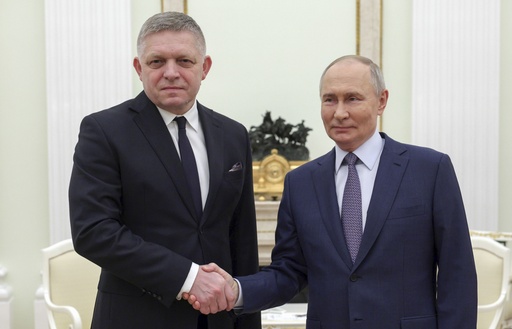
Russian President Vladimir Putin welcomed Slovakia’s Prime Minister Robert Fico on Sunday, marking one of the few occasions an EU leader has visited the Kremlin since Russia’s full-scale invasion of Ukraine in February 2022.
Fico’s arrival in Russia was characterized as a “working visit,” with a private meeting alongside Putin slated for Sunday evening, as announced by Kremlin spokesperson Dmitry Peskov. The agenda for their discussions was anticipated to revolve around “the international situation” as well as matters regarding the supply of Russian natural gas.
Despite ongoing conflicts, Russian natural gas continues to flow to several European nations, including Slovakia, via Ukraine, under a five-year agreement that is set to terminate at the year’s end. At a recent summit in Brussels, Ukrainian President Volodymyr Zelenskyy conveyed to EU officials that Ukraine does not plan to renew this arrangement, a stance Fico argues would adversely affect Slovakia’s interests.
In light of this situation, Slovakia recently established a short-term pilot contract to procure natural gas from Azerbaijan, aiming to adapt to a possible cessation of Russian gas supplies through Ukraine. Earlier this year, the Slovak government also reached an accord to import liquefied natural gas from the United States via a pipeline running through Poland.
Furthermore, Slovakia has the capability to secure gas through connections with Austrian, Hungarian, and Czech networks, which could facilitate imports from Germany and other potential suppliers.
Interactions between European leaders and Putin have been infrequent following Russia’s military incursions into Ukraine, although Hungary’s Prime Minister Viktor Orbán had visited Russia in July, and Austrian Chancellor Karl Nehammer met with Putin shortly after the war escalated. Both visits faced backlash from Kyiv and other European politicians.
Orbán is perceived as having the closest ties with Putin among EU leaders, consistently obstructing efforts within the EU to support Ukraine or enforce sanctions against Russia for its activities in the region. He has advocated for an end to hostilities in Ukraine without specifying the implications for the country’s territorial integrity or future security.
Fico’s perspectives on the conflict in Ukraine markedly diverge from those of his European counterparts. He reentered power last year when his leftist party, Smer (Direction), achieved victory in parliamentary elections through a pro-Russia and anti-American agenda. Following his return, he has ceased Slovakia’s military assistance to Ukraine, criticized EU sanctions against Russia, and pledged to oppose Ukraine’s accession to NATO.
Furthermore, Fico has distinguished himself as a rare senior EU figure appearing on Russian state television since the invasion began. In an October interview with the Rossiya-1 channel, he claimed that Western support for Ukraine has “prolonged the war” and criticized sanctions on Russia as ineffective, expressing his willingness to engage in negotiations with Putin.
He also announced plans to attend the military parade in Moscow next May, commemorating the 80th anniversary of Nazi Germany’s defeat in World War II. The Kremlin has utilized these annual “Victory Day” celebrations to display military accomplishments, with Putin previously lauding Russian soldiers engaged in the Ukraine conflict as “heroes” during this year’s commemoration.
